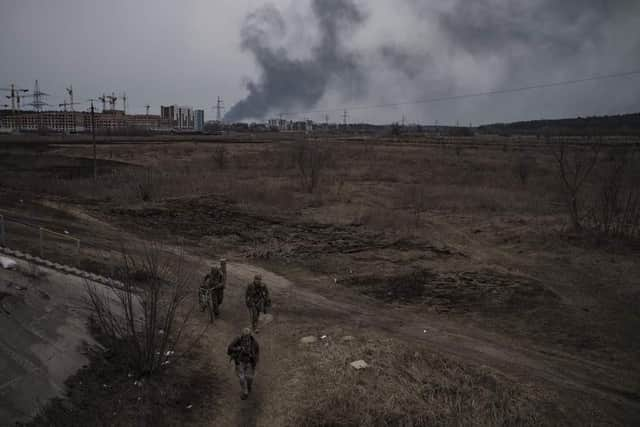Ukraine conflict: MoD gives significant update on Russian private military company Wagner as Kremlin seeks to win support of African states
The Institute for the Study of War, based in Washington DC, reported the Russians were using mercenaries from the shadowy Wagner Group to capture the Vuhledar Power Plant on the northern outskirts of the Novoluhanske village.
The company, along with our private groups, are thought to be in use in Ukraine.
Advertisement
Hide AdAdvertisement
Hide Ad“Russian private military company Wagner has likely succeeded in making tactical advances in the Donbas around the Vuhlehirska Power Plant and the nearby village of Novoluhanske,” the MoD said in a statement. “Some Ukrainian forces have likely withdrawn from the area.


“Russian foreign minister Sergei Lavrov is currently undertaking a tour of Egypt, Ethiopia, Uganda, and the Republic of the Congo.
“Russia will highly likely seek to exploit the visits to blame the West for the international food crisis and win the support of African states which have otherwise remained neutral about Russia’s invasion of Ukraine.
“Since 2014, Russia has made significant efforts to secure influence across Africa, with Wagner frequently deploying as one of its favoured tools of influence in the region.
“Russia probably primarily engages with Africa because it believes it will enhance the ‘Great Power’ identity Russia aspires to.
"Its secondary goals are probably to secure commodity concessions and to persuade African states to vote in line with Russia’s interests in international forums.”
Russia’s foreign minister has denied his country is responsible for the global surge in food prices following its invasion of Ukraine, dismissing the “so-called food crisis” as he completed a visit to several African nations on a continent hit especially hard.
Addressing reporters and African diplomats in Ethiopia’s capital Addis Ababa, Mr Lavrov accused the United States and European countries of driving up prices by pursuing “reckless” green policies and even hoarding food during the Covid-19 pandemic.
Advertisement
Hide AdAdvertisement
Hide Ad“The situation in Ukraine did additionally negatively affect food markets, but not due to the Russian special operation, rather due to the absolutely inadequate reaction of the West, which announced sanctions,” Mr Lavrov said.
Western countries, for their part, have repeatedly pointed out that food is exempt from their sanctions on Russia and have blamed Moscow for the global crisis.
Mr Lavrov said last week’s breakthrough deal to provide safe corridors through the Black Sea for tons of trapped grain out of Ukraine “could have been announced long, long ago if not for the western stubbornness in insisting they are always right”.
He said Russian and Turkish ships will escort ships that have been trapped in Ukrainian ports through the Black Sea once Ukraine demines its coastline.
Many African countries rely heavily on wheat imports from Russia and Ukraine. African leaders weeks ago visited Moscow to express their food concerns while a looming famine stalks the Horn of Africa, including Ethiopia, during the worst drought in decades.
But many African nations have not openly criticised Russia over its invasion of Ukraine.
Experts have cited Moscow’s support for some African nations dating back to the Soviet Union or Russia’s role as a major arms supplier to the continent while sending relatively little humanitarian aid.
Ethiopia is Africa’s diplomatic hub and second most populous country.
